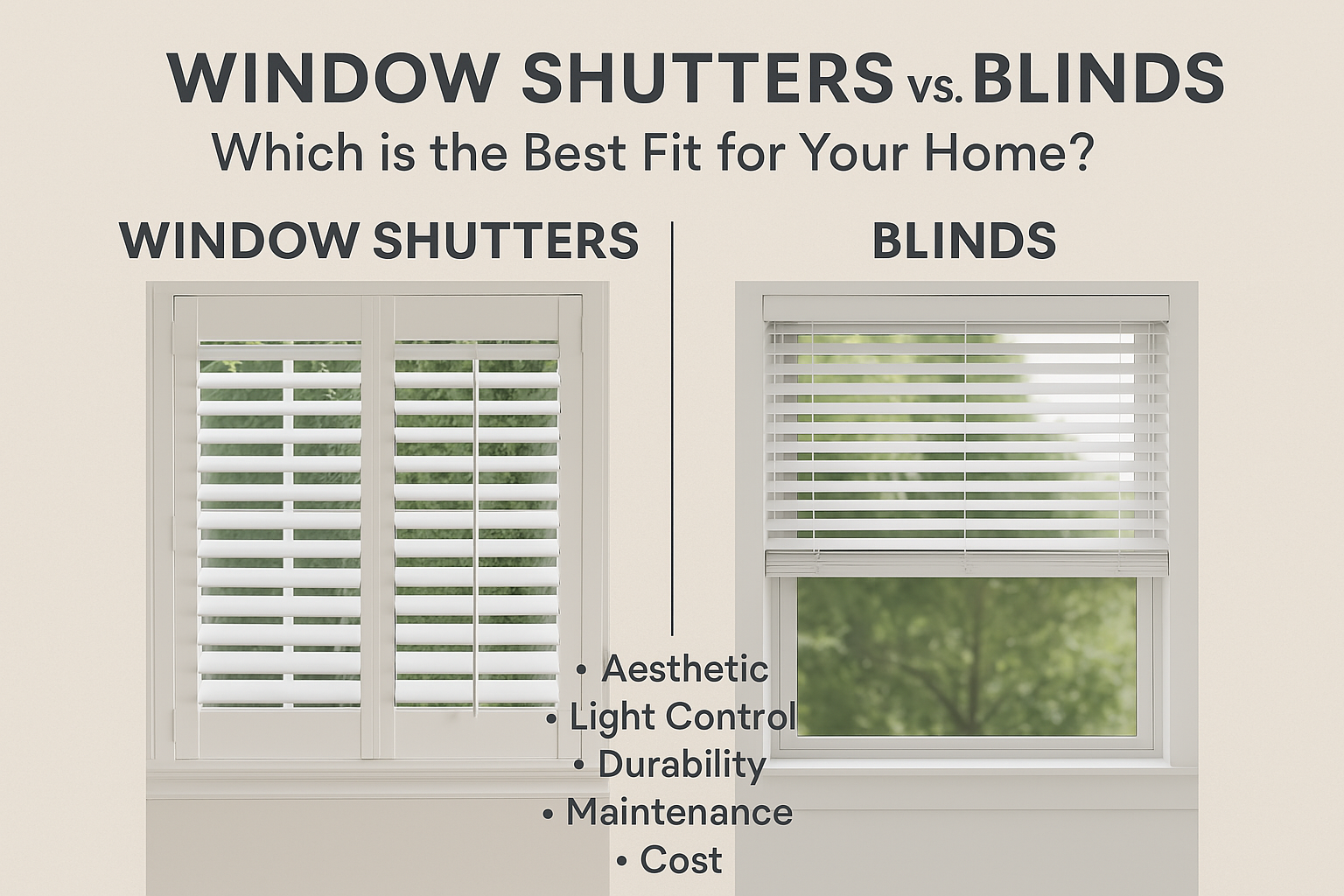Window Shutters vs. Blinds: What’s the Best Option for Your Home?
When it comes to covering your windows, you have two popular options to choose from: window shutters and blinds. Both of these window treatments offer privacy, control over light, and style to your home. But how do you decide which one is the best fit for your needs? Let’s take a closer look at window shutters vs. blinds to help you make the right choice.
1. Aesthetic and Style
The first thing you’ll notice when comparing window shutters and blinds is their appearance.
Window Shutters:
- Shutters offer a more classic and elegant look. They come in a variety of styles, such as plantation shutters and full-height shutters, and are made from materials like wood, composite, or vinyl.
- Shutters tend to add a sophisticated touch to any room. Whether you’re decorating a traditional living room or a modern kitchen, shutters blend seamlessly into most home designs.
Blinds:
- Blinds, on the other hand, have a simpler design. They come in many styles, such as vertical blinds, mini blinds, and Roman blinds. You can choose from different materials like wood, aluminum, and plastic.
- While blinds are functional, they may not offer the same polished, elegant look that shutters do. They work great in modern, casual spaces, but might not elevate the style of a room as shutters would.
Verdict: If you’re after a sleek, timeless, and high-end look, window shutters are a better choice. However, if you prefer a simpler, more functional approach, blinds might suit your needs.
2. Light Control and Privacy
Both shutters and blinds allow you to control how much light enters your room and offer privacy. However, they do it in slightly different ways.
Window Shutters:
- Shutters are great for controlling light and privacy. With their wide slats, you can easily adjust the amount of light that comes in. You can open them completely for a full view or close them tightly for maximum light blocking.
- The solid construction of shutters also helps prevent light from seeping through the sides, providing more privacy.
Blinds:
- Blinds give you the flexibility to adjust the slats to your desired level of light, but they may not block out light as efficiently as shutters. Some types of blinds, especially mini blinds, may leave small gaps between slats where light can still filter through.
- While blinds can provide privacy when closed, they may not be as effective as shutters in blocking outside views.
Verdict: If light control and privacy are a top priority, shutters are a better option because they offer a more complete and adjustable solution.
3. Durability and Longevity
When investing in window coverings, durability and longevity are important factors to consider.
Window Shutters:
- Shutters are built to last. They are made from strong materials like wood, composite, or vinyl, which can withstand wear and tear for many years.
- With proper care, shutters can even increase the value of your home due to their classic and long-lasting appeal.
Blinds:
- Blinds can vary in durability depending on the material. Wooden blinds tend to last longer than plastic blinds, but even the most durable blinds may show signs of wear sooner than shutters.
- Blinds are more prone to bending or breaking, especially if they are adjusted frequently or exposed to direct sunlight for long periods.
Verdict: If you’re looking for something that will stand the test of time, shutters are a more durable investment. Blinds may need replacing more often, especially if they are made from lighter materials.
4. Maintenance and Cleaning
How easy is it to maintain window shutters and blinds? Let’s break it down.
Window Shutters:
- Shutters are relatively easy to maintain. A quick wipe with a damp cloth is usually enough to keep them clean. There’s no need to remove dust or debris from small slats, as with blinds.
- If you choose wood shutters, you may need to occasionally dust and polish them to keep their finish looking new.
Blinds:
- Blinds, especially mini blinds, can be a bit more difficult to clean. Dust can build up on the narrow slats, and it may take more time to wipe down each one individually.
- Blinds also have cords or strings that can collect dust and dirt, making them harder to clean compared to shutters.
Verdict: Shutters are easier to clean and require less maintenance compared to blinds, which need more frequent attention to keep them dust-free.
5. Energy Efficiency
Both window shutters and blinds can help with energy efficiency, but they perform differently.
Window Shutters:
- Shutters offer better insulation. The solid design of wood or composite shutters creates an effective barrier between your windows and the interior of your home. This can help keep the temperature stable, reducing your heating and cooling costs.
- If energy efficiency is a priority, shutters can help you save money over time by providing insulation and blocking out drafts.
Blinds:
- Blinds also provide some insulation, especially if they are made from wood or faux wood. However, they are not as effective as shutters in blocking heat transfer and preventing drafts.
- While blinds can help control light, they won’t offer the same level of energy savings as shutters.
Verdict: Shutters are more energy-efficient, making them the better choice if you want to reduce your energy bills.
6. Cost Considerations
Cost is often one of the biggest deciding factors when choosing between shutters and blinds.
Window Shutters:
- Shutters tend to be more expensive upfront, especially if you choose high-quality materials or custom designs. The cost of installation is also higher compared to blinds.
- However, because shutters are more durable and energy-efficient, they can be a better investment in the long run.
Blinds:
- Blinds are typically more affordable than shutters. You can find blinds in a wide range of price points, making them a more budget-friendly option.
- While they are cheaper initially, you may end up spending more over time if you have to replace them due to wear or damage.
Verdict: If you’re on a budget, blinds are the more affordable option. But if you’re looking for long-term value and durability, shutters may be worth the higher upfront cost.
Conclusion: Which One Is Best for You?
Both window shutters and blinds have their own unique benefits. If you’re looking for a more elegant and timeless look, better light control, durability, and energy efficiency, window shutters are likely the better choice. However, if you’re working with a smaller budget and need a simple, flexible solution, blinds can be a great option for your home.
Ultimately, the decision depends on your style preferences, budget, and long-term needs. Whatever you choose, both options can enhance the comfort, privacy, and beauty of your home.
FAQS:
What’s the main difference between window shutters and blinds?
Window shutters offer a more elegant, permanent fixture with wide, adjustable slats, while blinds are simpler, flexible window coverings that come in various styles and materials.
Which is better for privacy, shutters or blinds?
Shutters provide better privacy because their solid construction and wide slats block more outside views. Blinds can leave gaps between slats, offering less privacy.
Are window shutters more expensive than blinds?
Yes, shutters tend to be more expensive upfront due to their durable materials and custom installation. Blinds are a more budget-friendly option, especially for standard window sizes.
Do shutters help with energy efficiency?
Yes, shutters are excellent for energy efficiency. Their solid design creates better insulation, helping to regulate temperature and reduce heating and cooling costs compared to blinds.
Which option is easier to clean, shutters or blinds?
Shutters are easier to clean, as they have fewer gaps and can be wiped down quickly. Blinds, especially mini blinds, tend to accumulate dust in their narrow slats and can take more time to clean.




